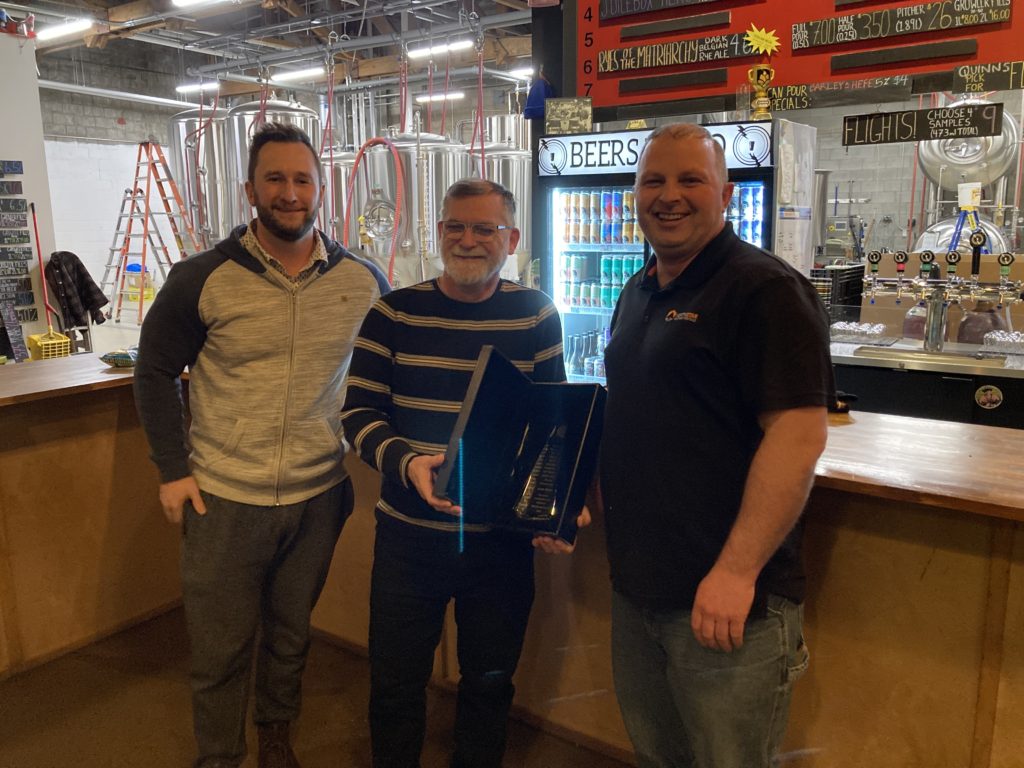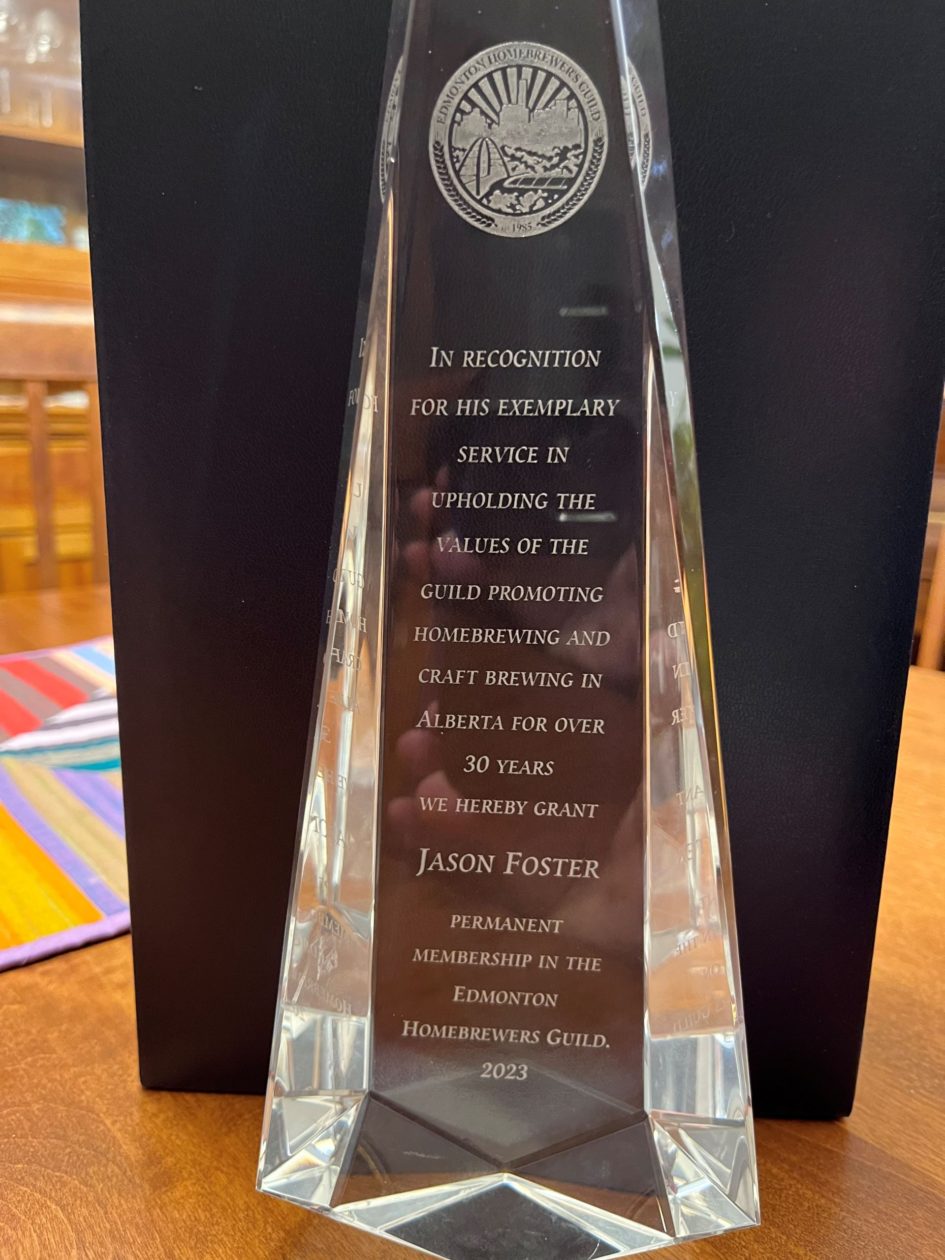This is a slightly awkward post to write. Earlier this week the Edmonton Homebrewers’ Guild (EHG), long my homebrewing home base, bestowed on me a lifetime membership. It, surprisingly, came with an etched glass award to commemorate the occasion.
I am deeply honoured and humbled. And I hope you will indulge me to tell you why.
Homebrewing is how I got into beer. It was 1991 and I was an undergrad at the UofA, still living at home. A friend told me how you could make your own beer for less than 30 cents a bottle. That number caught my attention, being the poor student that I was. And so I gave it a shot.
At the time “homebrew” meant going to Superstore to pick up an aluminum can of concentrated wort. Instructions: add 20 litres water, 5 cups corn sugar and sprinkle the included dry yeast packet. Three weeks later you had beer. Sort of.
It was god-awful stuff. I even knew that at the time. It was cidery, thin and usually overcarbonated. But there was something about the process that got me. I could turn sugar, water and yeast into beer (yes, I know that I didn’t do that, the yeast did, but you get my point). I wasn’t satisfied, so I started researching. At the time that wasn’t the easiest thing to do. Thank goodness I found a homebrew shop (Harvest Brewing on Argyll, for the record) and they had some books by Charlie Papazian. That changed everything.
By 1993 I was using real extracts and trying to figure out how to build an all-grain system. In 1994 I brewed my first all-grain batch. It was quite the DIY adventure. Two nested buckets, one with a perforated bottom, served as my mash tun. Multiple pots on the stove were my hot liquor tank(s). No real way to cool the wort down (I think I filled the tub with ice water). Those first couple beer were also not so great, but I persevered.
I eventually pulled enough rudimentary equipment together (e.g., a homemade copper immersion chiller) to make a decent all-grain beer. Temperature control? Impossible. Prevention of oxygen ingress post-fermentation? What was that? Still, the beer tasted better and I could see the potential in this crazy hobby.
Plus, I was all-in at that point. I loved the process, the challenge and the way it used a different part of my brain than the rest of my life – that is all still true today. I read whatever books I could find, pestered the guys at the homebrew store, and looked for mentors. I met Soren Jensen, longtime Danish-borne homebrewer and sometimes professional brewer, through some political campaigns. He helped and encouraged me, and also pestered me to come to a meeting of the EHG. After a while I finally relented.

I don’t remember the date of my first EHG meeting. I know it was in the fall and the meeting was at Alley Kat Brewing, so it had to be in 1997 or 1998 (they opened in 1995 and our youngest daughter was born in 1996 so I doubt it was earlier than that). At first it was awkward as hell. For a while I stood around by myself, wondering why I had come. Clearly homebrewers had no sense of social introduction. However, after a bit someone approached me with a beer and said: “Try this. What do you think?”
That was all it took. Very quickly I became a regular at EHG meetings. Swapping samples of homebrew, talking brewing process and learning a tonne about how to make my beer better. I tried to play the role of the guy who approached the newcomer with a beer sample in hand. During that time I met a number of people I consider friends today. And a couple friends who are no longer with us. These meetings built both camaraderie and my brewing chops.
The Guild gave me the confidence to enter my beer in competitions. In 1999 I won my first medal at the now-defunct Marquis de Suds competition in Calgary – a gold for my oatmeal stout. By the time I officially retired from competing in 2010, I had picked up 60 medals (including 2 BOS medals), which – in my opinion – is impressive because I never entered more than three or four beer in any competition. I never brewed frequently enough to build up a cache of competition-only beer. Interestingly (to me) my oatmeal stout garnered a dozen of those medals. Clearly that recipe is dialed in.
The EHG also facilitated my entry into the world of beer judging. At the urging of then-EHG president Roxy Hastings (rest in peace, Roxy), I took their Beer Judge Certification Program (BJCP) exam prep course and wrote the exam in 2005. I think I even owe my current ranking as Master judge to EHG, because as I scan my BJCP record the Aurora Brewing Challenge (ABC) and other EHG-sponsored competitions appear frequently.
In the years since I have been fortunate to find platforms to expound about beer and have built a small sideline gig as a beer writer and educator. I think my homebrewing roots play a role in how I approach that work. I don’t just know about beer history and beer styles and the theory of brewing. I live it, albeit at a small scale. I experience first hand the wonders and challenges of brewing, which means I can bring to my work both the passion and the humility that it fosters.
So this rambling post is just a long way to say that I owe more to EHG than they do to me. Their decision to offer me a lifetime membership will forever stand out for me as a highlight of my brewing life. I know it is “just” a homebrew club, but it is MY homebrew club, and I have always been and always will be proud to be a member. Plus, the labour historian in me loves that we call ourselves a Guild.
In the last few years I have become less active in the club, as these things happen. I haven’t been going to meetings much, although I religiously book off time to judge the ABC and agree to anything the club asks me to do. This is still my home, even if I don’t really know many of the active members anymore. And what more can anyone ask for than a permanent home? Which is what they seem to have given me with their award. Wow!
Thank you, Edmonton Homebrewers’ Guild.



February 10, 2024 at 2:42 PM
You deserve all the cudos and accolades Jason! Cheers to another 30?
Congratulations from your “dealer” of 27 years. Andrew, Bernie, Jeff and Mark.
February 11, 2024 at 7:14 PM
Thanks, Andrew.
Indeed, where would I be without the gang at Winning Wines Plus Lendrum all these years? Likely still brewing with a couple of plastic buckets!
Cheers.
Jason